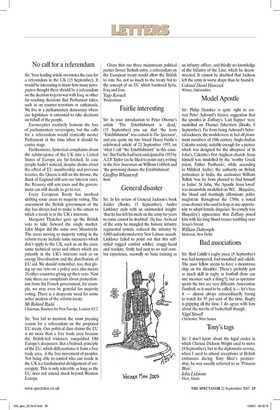No call for a referendum
Sir: Your leading article overstates the case for a referendum in the UK (15 September). It would be interesting to know how many newspapers thought there should be a referendum on the decision to go to war with Iraq, or other far-reaching decisions that Parliament takes, such as on counter-terrorism or euthanasia. We live in a parliamentary democracy where our legislature is entrusted to take decisions on behalf of the people.
Eurosceptics routinely bemoan the loss of parliamentary sovereignty, but the calls for a referendum would ironically neuter Parliament at the time when it should be centre stage.
Furthermore, hysterical complaints about the submergence of the UK into a United States of Europe are far-fetched. In case people hadn't noticed, despite claims about the effect of EU membership and previous treaties, the Queen is still on the throne, the Bank of England still sets our interest rates, the Treasury still sets taxes and the government can still decide to go to war.
Every European Treaty has involved shifting some areas to majority voting. The assessment the British government of the day has always had to make is the extent to which a treaty is in the UK's interests.
Margaret Thatcher gave up the British veto to take forward the single market. John Major did the same over Maastricht. The areas moving to majority voting in the reform treaty include some measures which don't apply to the UK, such as on the euro, some technical areas and others which are patently in the UK's interests such as on energy liberalisation and the distribution of EU aid. We should remember, too, that giving up our veto on a policy area also means 26 other countries giving up their veto. Next time there are complaints about protectionism from the French government, for example, we may even be grateful for majority voting. There is a desperate need for some sober analysis of the reform treaty.
Mr Roland Rudd Chairman, Business for New Europe, London EC2 Sir: You fail to mention the most pressing reason for a referendum on the proposed EU treaty. Our political class claims the EU is no more than a free trade area because the British-led wideners vanquished Old Europe's deepeners. But a bedrock principle of the EU, which differentiates it from a free trade area, is the free movement of peoples. Not being able to control who can reside in the UK is a fundamental abridgement of sovereignty. This is only tolerable as long as the EU does not extend much beyond Western Europe.
Given that our three mainstream political parties favour Turkish entry, a referendum on the European treaty would allow the British to vote No, not so much to the treaty but to the concept of an EU which bordered Syria, Iraq and Iran.
Yugo Kovach Twickenham

































































 Previous page
Previous page